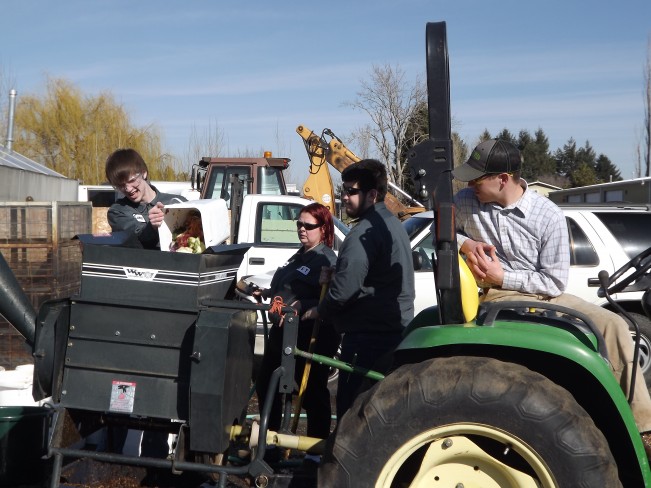Expanding Program Provides New Courses and Industry Experience to New and Returning Students
By Betsy Fradd, WSU Extension
Chris Madsen needed to change careers. After owning and operating his own construction business for over twenty years, a hand injury propelled him to look in other directions. At 45, the father of two enrolled in the Plant Operations program at Walla Walla Community College (WWCC). “An area that is focused on heavily is the chemical process we use in order to utilize bioenergy,” said Madsen who also completed a summer internship at biorefinery developer ZeaChem, an industry partner of the Advanced Hardwood Biofuels Northwest project.
Madsen and others are part of a growing number of students recognizing the value of instruction and hands-on experience to meet the needs of a growing bioproducts workforce. The program, which is administered in partnership with the Agriculture Center of Excellence, is a component of AHB’s education efforts. Classes began in the fall of 2013, and in addition to the core applied associate degree in Plant Operations, students can earn certificates in Bioproducts, Biomass Feedstock Management, or even a transfer degree in Plant Operations.

“The program prepares students to work in facilities converting biomass into electricity, heat, transportation fuels, clean water, and high-value chemicals and products,” said Jason Selwitz, co-lead of AHB’s Education Team, the Project Manager at the Agriculture Center of Excellence and a WWCC Energy Systems Technology instructor.
Students are pursuing careers in public works, utilities, pulp and paper, food processing, industrial maintenance, wastewater and drinking water treatment, agriculture and forestry, bioproducts, solid waste management/waste to energy, and engineering contractors. A minimum ten-week summer cooperative work experience is required between the first and second year of the program.

For Madsen, working in this industry also has a moral component. “I’ve used this planet’s resources for my benefit and see the effects imposed on our home, earth, and the environment,” said Madsen. “Through self and outside education I have come to realize that in order for all of us to continue, we have to value and take care of our planet to move us forward. It’s time to examine and research what benefits and works symbiotically with our needs.” Madsen’s son, 18-year-old, Michael, is also a student in the program.
As the program has developed so have the increased opportunities for internships and positions. “Three students turned internship experiences into jobs in the biofuels and wastewater areas,” said Selwitz. Industry representatives regularly visit campus to talk with students about their industry sectors, job openings, review resumes, and conduct mock interviews. “By June 2017, we project to see 21 current first year and dual degree students graduate into meaningful careers within the rural reaches of the Northwest.”
Growth and collaboration is also virtual. Seven Bellingham Technical College (BTC) Process Technology students are currently taking on-line courses in Plant Operations through WWCC. Students will earn their Process Technology degree at BTC and a Certificate in Bioproducts from WWCC. Additionally, expansion of the Plant Operations Program to the WWCC Clarkston campus will begin this fall where students can earn a Certificate in Industrial Maintenance followed by a degree in Plant Operations-Mechanic.
Chris Madsen is excited to graduate this June. “I see myself working at either ZeaChem, possibly a power plant, or working in some other biofuels-oriented field,” said Madsen. “At my age I am very thankful that this program came along when it did and that it is something that seriously interests me and has given me a second working life. The future is bright.”
Learn more about the Plant Operations program at Walla Walla Community College in coordination with the Agriculture Center of Excellence:
To register for fall classes or more information contact Jason Seltwitz
jason.selwitz@wwcc.edu or 509-527-3678
